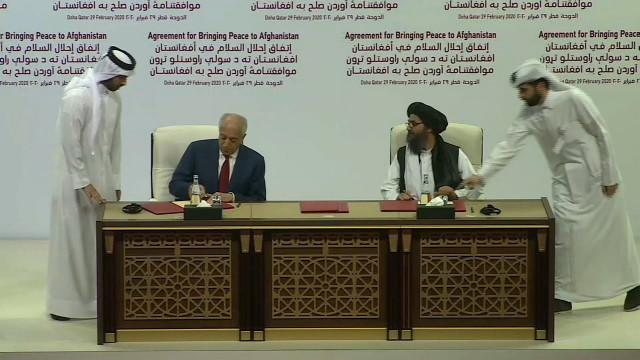Conglomerate of the Afghan peace deal
For Pakistan, this is a novel opportunity to get off the loads of past and start afresh

Afghan peace deal being signed. PHOTO: SCREENSHOT
Beginning from home, the September presidential polls have caused the parting of the ways between the Abdullah, Dostum and Ghani groups, as they recede into political dissent over the poll results where Ghani took over Abdullah Abdullah by a hair’s breadth majority, which on the reverse go was refuted by Abdullah and attributed to electoral rigging and corruption. This dissent comes at a time when peace is knocking at the door, thereby posing serious threats to meeting such an arduous series of intra-Afghan management of the deal.
The trust deficit stands as another proactive challenge to this peace deal. The Taliban apprehensions on their cohesive and indiscriminate participation in post-deal Afghanistan would require strong assurances from the people across the table, the likes of which are Ghani, Dostum and Abdullah. Simultaneously, the Afghan side, who personify the Taliban as Pakistan, would also demand trust-building measures such as Islamabad cutting off its so-called strategic supply lines to Afghanistan expended through the Taliban, while at the same time the Afghan government will have to settle down with the fact that Pakistan, and not India, is the immediate neighbour of Afghanistan. The strategic trust deficit widened by the erstwhile Indian interference must be built up on a strong foundation.
The Indian significance in the Afghan peace deal is not of any strategic worth as India was fixedly granted a position in Afghanistan by the US, chiefly out of two reasons. First was the US breakaway with Pakistan and secondly, because of the Iran factor. If it were not for these two reasons, India would have never had any say in Afghanistan’s matters. The US is reluctant to assign any role to Iran in Afghanistan’s affairs, despite if it were or not to make an exit from the country. At the same time, the importance of Iran being an immediate neighbour to Afghanistan and Iran’s regional geopolitics associate it with a strategic advantage in affecting the Afghan peace process. Iran’s presence would have to be ultimately included in the deal overtly or covertly by the US. Russia will be backing the Iranian version while China will heavily side on Pakistan’s approach.
For Pakistan, this is a novel opportunity to get off the loads of past and start afresh. The miseries borne by Pakistan out of the Afghan episode are numerous and Pakistan must give a sincerely die-hard effort in making this deal a success. Pakistan has good relations with Iran but when it comes to Afghanistan, their positions differ due to divided approaches of both the countries as regards their interests in Afghanistan. The war wreckage and its effects are now well realised by both the countries and they must communicate on the strategic and political levels to crystallise their approach dynamics towards the Afghan peace perception. A long-term peace in Afghanistan is only possible if all states, especially its immediate neighbours, honour the sovereignty of the Afghan state.
Published in The Express Tribune, March 1st, 2020.
Like Opinion & Editorial on Facebook, follow @ETOpEd on Twitter to receive all updates on all our daily pieces.



















COMMENTS
Comments are moderated and generally will be posted if they are on-topic and not abusive.
For more information, please see our Comments FAQ